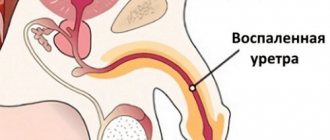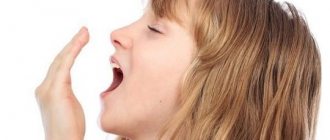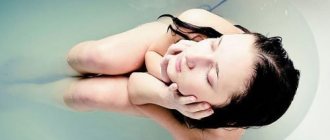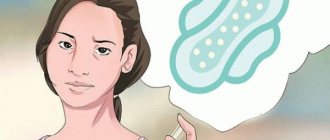Everyday Causes of Itching
The most common cause of itching after urination in women is chemical irritants. Many chemicals, including creams, foams, birth control, detergents and laundry products, including soaps and condoms, scented toilet paper and even softeners, can irritate the vagina and vulva and cause irritation. Symptoms of sensitivity or allergy include:
- vaginal itching or burning without foul-smelling or thick discharge,
- red and/or swollen labia, vulva or vaginal tissue,
- rash and/or thickened skin.
In this case, the most important thing is to find that very irritant and remove it from everyday life, which will lead to complete relief from discomfort. Dry or irritated skin around the vagina may itch when it comes into contact with urine because acid gets into the irritated area.
Non-infectious causes
Sharp pain and burning in the urethra are associated with:
- urolithiasis (urolithiasis);
- food that provokes symptoms (alcohol, coffee);
- chemical elements of personal hygiene products (soap, sanitary pads, toilet paper);
- injury during sexual intercourse;
- poor hygiene or renal colic;
- changes in the acidity level of the genitals due to too frequent grooming;
- diabetes mellitus or disharmonious conditions;
- gout;
- pubic lice;
- blockage of the canal - tumors, scars, adhesions.
Vulvar contact dermatitis
Vulvar contact dermatitis is an inflammation of the skin caused by an external agent that acts as an irritant or allergen.
The skin reaction may be acute, subacute or chronic as a result of prolonged exposure to mild irritants. The most common form is irritant contact dermatitis, which usually manifests as vulvar itching. The reasons contributing to the development of vulvar dermatitis are:
- increased sensitivity of the skin of the vulva to irritants compared to other parts of the body,
- decreased skin barrier function due to exposure to sweat, urine and vaginal discharge,
- constant rubbing of the vulva area,
- In menopausal women, a lack of estrogen promotes tissue atrophy and thinning and can increase the effect of irritants on the skin of the vulva.
Main symptoms:
- vaginal itching or burning, including itching after urination,
- vaginal redness,
- vaginal discharge.
Cosmetic procedures
Over the past year, women have become more concerned with the design (yes!) of their private parts.
In many cases, this is not just hair removal, but they manage to create all sorts of interesting designs there. And even basic shaving can lead to itching, not to mention hair removal using various procedures. When we wax or shave our body, we compromise the integrity of the skin.
But often itching in the intimate area is a symptom of a more serious disease, including:
Diagnostics
The examination begins with clarifying the medical history and disease, but additional laboratory examination is mandatory. For this purpose, a woman’s doctor may prescribe the following additional examinations:
- Analysis of urine;
- urine analysis according to Nechiporenko;
- microscopic and microbiological examination of urinary sediment with inoculation on nutrient media;
- determining the sensitivity of the pathogen to antibacterial drugs;
- PCR;
- ELISA;
- vaginal smear;
- urethral smear.
And based on the data obtained, treatment is prescribed that will once and for all relieve the unpleasant symptoms of the disease.
The following indicators are analyzed:
- The presence of a high level of leukocytes indicates an inflammatory process in the bladder and urethra.
- A protein level that exceeds the norm indicates kidney disease.
- The appearance of salt crystals is a symptom of urolithiasis. An ultrasound of the internal organ may be needed.
Additionally, laboratory examination includes a general blood test.
Additionally, laboratory examination includes the following manipulations:
- Analysis of a smear for vaginal cleanliness (bacterial culture) and for the detection of sexually transmitted infections (PCR method).
- General blood analysis.
- Enzyme immunoassay blood test to detect antibodies to infectious agents.
When making a diagnosis, the doctor must take into account both the symptoms of the disease and clinical indicators.
Urolithiasis often produces symptoms such as frequent urination, pain, and cramping in the lower abdomen, which worsen when going to the toilet. Stones form in the kidneys and bladder. Leaving their place, urates, oxalates or struvites move through the narrow ureter, tending to the exit.
There are cases when stones come out unnoticed, without causing any suffering to a person at all. This is a rare case. It all depends on the type and origin of the foreign body in the kidneys. Stones are formed from all kinds of salts. Improper metabolism leads to the formation and growth of oxalates, urates, struvites and other varieties of these substances.
Stones or sand in the kidneys can torment patients at any age, even children. Drinking a small amount of fluid and poor nutrition lead to the need to begin treatment for diseases associated with the formation of stones.
To make a correct diagnosis, the following studies are prescribed:
- clinical urine analysis;
- flora smears;
- cystoscopy;
- bacteriological examination of urine;
- PCR analysis to detect infections;
- Ultrasound of the pelvic organs;
- blood chemistry;
- radiography of the kidneys;
- bladder biopsy.
Based on the test results, the specialist will be able to prescribe individual treatment. Antibiotic therapy may be used.
In addition to all laboratory tests and tests, a complete examination of the woman by a gynecologist is necessary. A nephrologist should also conduct an examination in order to exclude or confirm the presence of stones or other pathologies.
Vaginal infections
The most common cause of itching after urination in women is vaginal infections, of which there are several types. Their symptoms are similar, since regardless of the cause of their appearance and location, they are all caused by microorganisms and lead to inflammation.
| Types | Causes | Symptoms | Treatment |
| Yeast infections | Caused by the fungus Candida Albicans - this is the scientific name for yeast that lives almost everywhere, including in the human body. Usually the immune system keeps it under control, but in some cases, when the immune system is weakened (in case of illness or after taking antibiotics), the fungus begins to multiply unhindered in the vagina. |
| Yeast infections occur in 25 to 70 percent of women after antibiotic treatment. A doctor's visit is required. |
| Bacterial vaginosis | They occur in cases of abundant and unhindered proliferation of bacteria in the vagina. But the exact reason is not known. According to some doctors, the trigger is sexual relations, but this is just a hypothesis. |
| Treated with antibiotics. An advanced form can lead to inflammation of the pelvic organs. |
| Urinary tract infections | Cystitis, or a bladder infection, occurs when bacteria gets into the bladder, which is normally sterile. Bacteria that live in the vagina and genital area enter the bladder through the urethra, which connects the bladder to the outside of the body. In women, the urethra is very short and has an opening near the vagina. Because of these two factors, bladder infections are common in women and are often caused by poor hygiene. |
| Treatment includes one or more antibiotics. |
Treatment of pain and burning during urination in women
Doctors at the Yusupov Hospital treat not the symptom, but the patient. To eliminate pain and burning when urinating in women, therapy is carried out aimed at treating the underlying disease. If the inflammatory process is infectious, broad-spectrum antibiotics are first prescribed, then antibacterial therapy is adjusted depending on the results of determining the sensitivity of microorganisms to antibiotics.
For infectious cystitis, which causes pain and burning during urination in women, urologists prescribe the following antibacterial drugs:
- Monural is an antibiotic that has an effective antibacterial effect against most infectious agents of the urinary system. It is prescribed until the results of a bacterial urine test are obtained. Monural is produced in the form of granules, but it can also be purchased in the form of a suspension or powder. The medicine is taken once and is not used for chronic cystitis;
- Nolitsin is a broad-spectrum antibacterial drug, a second-generation fluoroquinolone antibiotic. The drug is prescribed for pain and burning during urination, when the pathogen is resistant to other antibiotics;
- Nitroxoline is an antibiotic that is effective against most types of bacteria, as well as fungi such as Candida. Prescribed for various diseases of the urinary system, in which women experience pain during or after urination;
- Furagin - the active substance of this antibiotic is a derivative of nitrofuran. Microorganisms slowly develop resistance to furagin in microorganisms;
- Nevigramon is a urinary antiseptic whose active ingredient is nalidixic acid. It has a pronounced bactericidal effect and is used for infectious and inflammatory lesions of the kidneys, ureter and bladder;
- Rulid belongs to the group of macrolides, is a broad-spectrum antibiotic, can be used in the treatment of cystitis;
- Furadonin is a drug that has an antimicrobial effect. Used in the treatment and prevention of bacterial infections of the urinary system.
For the treatment of inflammatory diseases of the genitourinary system, which are manifested by pain and burning during urination, herbal preparations are used:
- Cyston consists of aqueous extracts of many medicinal plants. The drug helps to gradually reduce the size of stones and reduce inflammation in the urinary tract. Has a bactericidal and bacteriostatic effect, suppresses the proliferation of microorganisms in the urinary canal, enhances the effect of taking antibiotics;
- Lingonberry leaves contain many beneficial substances. Their positive effect on the urinary system is due to the high content of phenol glycosides. When taking a decoction of lingonberry leaves, inflammation in the body is reduced, microorganisms that are present in the organs of the urinary system are destroyed;
- The most famous natural remedy for cystitis is cranberry juice. Due to its pronounced antimicrobial effect, cranberries are popularly called a natural antibiotic. Cranberries in the form of fruit juice or extract are widely used to prevent the recurrence and exacerbation of chronic cystitis. Monurel is a highly concentrated cranberry extract, a broad-spectrum antibiotic of plant origin.
If pain and burning during urination are a manifestation of urolithiasis, analgesics, non-steroidal anti-inflammatory drugs and antispasmodics are prescribed. During the treatment of pain with frequent urge to urinate, patients are advised to follow a diet and adhere to the correct drinking regime. 1.5-2 liters of non-carbonated purified water, drunk during the day, helps flush out pathogenic microflora from the bladder and reduce inflammation.
To eliminate the discomfort that occurs with painful urination, women are recommended to use an intimate restorative gel. The ingredients that make up it (tea tree oil, chamomile extract, lactic acid and panthenol) have a regenerating, antiseptic, anti-inflammatory effect. In women, pain and itching in the vagina disappear faster, and urination becomes painless.
If you have pain and burning during or after urination, call the contact center and make an appointment with a urologist. If the pain is caused by an attack of urolithiasis and is not relieved by analgesics and antispasmodics, come to the Yusupov Hospital, regardless of the time of day or day of the week. Doctors provide emergency care around the clock and relieve pain. Urologists will examine and treat the underlying disease that caused pain and burning when urinating in a woman.
Author
Sergey Borisovich Shornikov
Cardiologist
Atrophic vaginitis
Atrophic vaginitis is an inflammation of the vagina and surrounding structures. Caused by a decrease in estrogen levels with subsequent thinning of the endometrial and vaginal mucosa and an increase in its vaginal pH. Often found in premenopausal and menopausal women. Symptoms:
- dryness, burning and itching,
- vaginal discharge,
- vaginal bleeding,
- delayed or irregular periods,
- vaginal itching or burning,
- signs of inflammation of the urinary tract.
Treatment effectively manages symptoms.
Non-communicable diseases
Burning sensation when urinating in women occurs with the development of diseases not associated with infectious infection. Among them, the following stand out:
- Atrophic vaginitis. Older patients mainly suffer from this problem. With aging, hormonal levels are adjusted, and vaginal tissue atrophy develops. They become too dry and quickly become damaged. Urine falling on them causes pain and burning.
- Urolithiasis disease. With this problem, stones form in the organs of the urinary system. The movement of stones leads to damage to the walls of the urethra.
- Neoplasms in the urinary organs. They can be benign or malignant. As the formations grow, they block the urine outflow pathway, which causes pain when urinating.
Such diseases are difficult to treat. They often remain for life, becoming chronic.
The causes of burning may lie in mechanical damage. Injuries result from accidents or improper medical procedures.
Climax
Menopause is a turning point in a woman's life when her monthly cycles end and her ovaries stop producing the hormones that support them. The transition to menopause is called premenopause and can be accompanied by the following symptoms:
- mood swings.
- fatigue,
- menstrual irregularities,
- vaginal discharge,
- anxiety, sleep problems.
About 50% of menopausal women will experience dryness around the vagina as estrogen levels drop, which can cause itching and soreness in the intimate area, leading to pain during intercourse and a burning sensation when urinating. Over-the-counter lubricating creams can be a good solution to this problem. You can also use estrogens in the form of creams or pessaries, which are available by prescription, to increase the volume of the tissue around the vagina and relieve symptoms.
Treatment with folk remedies
Pain and burning during urination can be successfully relieved with infusions and decoctions of medicinal herbs. They act comprehensively, relieving discomfort and inflammation throughout the entire genitourinary system, and strengthen the body.
There are a large number of recipes using both one plant and herbal mixtures. The form of medicinal products: decoctions, when crushed plant materials are boiled for 10–15 minutes over an open fire or water bath (then the solution is filtered) and infusions (the herb is poured with boiling water and kept for the time specified in the recipe). If infusion requires a long time, use a thermos. Only fresh decoctions should be used in treatment, which should be done every day.
Dill seed decoction
To relieve pain in the genitourinary tract, decoctions of Dill and Parsley seeds are used.
Fresh Juice
Prepared from well-washed stems and roots of the plant. Has anti-inflammatory, analgesic, diuretic effects. Contains vitamin complexes. Take ½ glass several times a day. The product is not used during pregnancy and urolithiasis.
Infusion of chopped greens
To prepare, you will need a teaspoon of finely chopped parsley, which is poured with a glass of boiling water. Leave in a thermos for up to 8 hours. Drink ½ cup before meals at least 5 times a day;
Infusion of Parsley seeds
To prepare in a thermos, pour 2 tablespoons of seeds with 500 grams of boiling water and leave overnight. Drink ½ glass throughout the day.
Parsley decoction with milk
To prepare, place fresh, highly chopped herbs and Parsley root (half a glass) on the bottom of the pan, pour in 300 g of milk. Heat carefully while watching the liquid. Once the milk foam begins to rise, remove from heat, cover and leave until cool, strain and drink ½ glass every 2 hours.
Parsley decoction with milk
Cucumber seed decoction
For preparation, take seeds from a yellow overripe cucumber. A tablespoon of dried seeds is poured into 300 g of hot water and boiled for 10–15 minutes, left to cool. Strain and drink 100 g in the morning, at lunch and in the evening half an hour before meals.
Bearberry herb decoction
It is considered one of the best remedies for relieving severe pain when urinating. For preparation, it is better to use pharmaceutical herbs (leaf or granular). A tablespoon of raw material is poured into a glass of cold water, placed in a water bath and simmered for up to half an hour. Cool, filter and dilute with boiling water, bringing to the original volume. Drink a tablespoon every 2 hours after meals.
Linden tea
Linden blossom
To relieve pain, use linden blossom tea - a teaspoon of herbal raw materials crushed in a coffee grinder, pour a glass of boiling water, leave for 15 minutes and drink as usual.
Infusion of lingonberry leaves and berries
To relieve pain, you can use both an infusion of lingonberry leaves and berries, and a decoction. To do this, highly crushed herb is steamed in a thermos with 300 g of boiling water and left for up to 3 hours. Drink half a glass three times a day before meals.
Dill seed infusion
To relieve pain, crushed seeds into powder are poured into a thermos with a glass of boiling water, left for at least three hours, and drunk a tablespoon every two hours.
Dill seed decoction
Seeds in the same proportion are kept in a water bath for 20 minutes, set aside until cooled, filtered and taken 50 g 5 times a day.
Lichen sclerosus
It is a chronic inflammatory disease of unknown cause that causes thin white patches to appear on the skin, especially around the vulva. It occurs in women who are postmenopausal (the last final stage of menopause). The disease is not completely curable, but with proper treatment, symptoms can be controlled. Main symptoms include:
- itching after urination in women,
- vaginal pain,
- painful sex,
- dry skin outside the vagina,
- painful urination.
The rash in this case can mimic vulvar cancer, so its appearance can complicate the situation a little. After eliminating the main cause of discomfort, it is recommended to undergo a re-examination.
Prevention
There are a number of rules:
- Dress appropriately for the weather. Try not to get too cold. It is necessary to keep your feet warm during the cold season to avoid urinary problems.
- Strengthen your immune system. The weakening of the immune defense provokes the predominance of opportunistic microorganisms that provoke genitourinary diseases.
- Monitor the bacterial balance in the vagina. If necessary, use suppositories containing lactobacilli. When using antibiotic therapy, be sure to use agents to restore the microflora.
- Use intimate hygiene gels containing natural antiseptics (aloe, chamomile) and lactic acid.
- Avoid synthetic underwear. Discomfort when urinating may be an allergic reaction to the tissue.
- Give preference to safe sex. Do not neglect latex contraceptives, especially if we are talking about sexual intercourse with an unfamiliar partner.
- Do not overuse douching, as the procedure helps wash out beneficial bacteria. Such actions are advisable after casual sex.
- Do not use other people's personal hygiene products.
- Get examined by a doctor every six months, especially if you suffer from chronic cystitis.
For prevention, you need to dress according to the weather and try not to get too cold.
Pubic lice
Pubic lice are an easily transmitted infestation of small insects that live in the genitals and cause the skin to itch wildly.
There are two causes of itching: lice bites and the eggs (nits) they lay on the skin, both of which cause irritation. Fun fact: You can get pubic lice in a hotel room.
Now for the bad news:
- sex is not the only way to get infected - they are transmitted from skin to skin,
- if you go to a dirty hotel and there are nits or lice on the sheets you slept on, you have become infected.
- you lend your sister your pants and she has lice, then you put on your pants and you are infested.
Infestations can be treated with over-the-counter medications such as Permethrin cream (same as for lice).
Non-hazardous reasons
Burning in the urethra in women
- consumption of particularly hot and spicy foods, after alcohol, coffee and carbonated drinks;
- in women after sex, such a symptom appears if during active sexual intercourse the urethra or mucous membrane of the genital organs was injured;
- after using a urogenital catheter, there may be difficulty starting urination, as well as a burning sensation at the end of the process;
- after a long labor, women often experience pain when urinating;
- with dehydration, when the concentration of salts in the urine increases.
Elimination of a burning sensation of this nature occurs on its own within a few days. In some cases, the use of antispasmodic drugs may be necessary.
Scabies
Scabies is a highly contagious skin infection. Caused by mites, it results in an itchy rash all over the body. Main symptoms:
- vaginal itching or burning,
- vulvovaginal redness,
- itching after urination in women, tingling throughout the body, in the buttocks, elbows.
The rash and severe itching should disappear within 2-4 days after treatment.
Mechanical reasons
Mechanical injuries often occur during too violent sexual intercourse. Another way to get injured is through surgery or vaginal examination.
External reasons:
- Catheter. When carrying out this procedure, often inept actions of personnel can lead to microtraumas inside the urethra.
- Surgery. Intervention by surgeons in the vaginal microflora can lead to the penetration of unnecessary microorganisms. And from the vagina, they pass into the urethra.
- Injury. Occurs in the urethral area after sexual intercourse in the form of microcracks. Fungi and bacteria easily penetrate into such cracks, which provokes a painful symptom. Another source of trauma can be a recent birth. The internal factor is the passage of fragments of kidney stones and sand.
Diagnosis and treatment
Although this problem is quite common, it is not always easy to diagnose.
This is partly because the sensation is itchy and can come from different places, both internal (such as the bladder) and external (the skin around the vagina). When there are no classic symptoms of a bladder infection (such as wanting to urinate all the time), it is difficult to tell whether the problem is the bladder or the vagina. Treatment of itching consists of eliminating the main allergen or disease as the root cause that caused this symptom. In most cases, with proper care, the discomfort will subside within a few days.
A very good result from irritation in an intimate area is obtained by using a moisturizer or diaper dermatitis cream, which is used for babies with irritation from prolonged exposure to diapers.
These tips will help most women if itching is not a symptom of the disease:
- Baking Soda Douche Some sources advise against using baking soda baths for yeast infections or UTIs, but many more women attest to their benefits and good results. Baking soda balances Ph levels; very alkaline, which is great for the vagina and which tends to maintain high levels of acidity. Washing with strong scented soaps can lower the pH levels needed for a healthy vagina, so be sure to avoid it—and douche.
- Coconut Milk Coconut milk has high antimicrobial properties that have been found to alleviate and even cure sexually transmitted diseases in women. A natural remedy for yeast infections, coconut milk can improve your overall health. You may already know that coconut is rich in electrolytes and potassium, but when you consider that both of these elements will also give you a burst of energy that is so lacking during menstruation or menopause, there is no doubt that coconut will be your salvation .
- Stay Dry and Wear Loose Clothes The next time you get out of the shower and rush to put on tight panties or decide to stay in a wet swimsuit longer than necessary, consider the fact that moisture in the vaginal area makes yeast infections worse. The next time you visit the beach, be sure to bring a change of clothes and a towel to avoid a nasty infection that can cause itching for several days. If you're not swimming, use this as a chance to wear loose fitting shorts that won't trap moisture, giving your skin extra room to breathe. Sleeping naked is a great way to let your skin breathe.
- Drink Water Drinking water is the easiest way to prevent a bacterial infection that can develop into a painful urinary tract infection. Beer or other yeast ingredients, such as bread and sugar, will increase the chances of an irritating yeast infection.
- Resist the urge to fall asleep after intimacy. This is an ideal scenario - in theory. But if you can momentarily break away from your partner's arms, you will reduce your chances of getting a urinary tract infection. Just try going to the toilet for 10 minutes. Ideally, it’s good to go before.
Women's urethra
The urethra is a hollow tube with flexible walls. The female canal (urethra feminine) is small, short, 2.5-4.5 cm long, 1.5 cm wide and 7-13 mm in diameter. The beginning of the female urethra is located at the bladder, it has a wide opening.
The canal passes through the urogenital diaphragm and has a narrow external opening. The end of the urethra is hidden in the genital slit. The canal runs parallel to the vagina and resembles a funnel.
The canal walls are formed from shells:
- mucous membrane (tunica mucosa);
- submucosa (tela submucosa);
- muscular (tunica muscularis).
Under the stratified epithelium there is a plate of the mucous layer, rich in elastic tissues that form longitudinal folds.
When dissected, you can find that its shape is star-shaped. On its back wall there is the highest fold, which is called the crest of the canal.
The submucosal layer is filled with venous microvessels. They pass into muscle tissue. This shell is formed by loose fibrous connective tissue.
The muscularis propria makes up a circular layer of smooth muscle fibers:
- External longitudinal.
- Internal circular.
The urethra has a voluntary sphincter (compressor), it is located where the urethra muscles pass.
If unpleasant symptoms of burning in the urethra appear, then we can certainly assume the presence of some pathology, or an infectious and inflammatory etiology.
The female channel is quite short, wide and open. These anatomical features facilitate easy entry of infectious microorganisms into the canal.
Often, the causes of burning in the urethral area are inflammations of either the mucous membrane or the bladder. Infectious microorganisms can enter and spread through both ascending and descending routes.
Medications should be prescribed if:
- burning in the urethra lasts more than two days;
- painful sensations, itching and atypical discharge appear;
- the number of urges to urinate increases;
- back pain added;
- the appearance of blood in the urine;
- The temperature rose and a headache appeared.
Specialists who will help make the correct diagnosis:
- gynecologist;
- dermatovenerologist;
- venereologist.
General treatment for burning in the urethra is focused on restoring the vaginal microflora. It is also necessary to restore the layers of the urethra and increase the immunity of the body as a whole.
Medication
In case of acute inflammation, antibiotics and anti-inflammatory drugs should be taken.
When a diagnosis of urethritis is made, the doctor prescribes a course of antibiotics.
Most Popular:
- Amoxiclav.
- Ciprofloxacin.
- Norfloxacin.
- Pefloxacin.
Amoxiclav Ciprofloxacin Norfloxacin Pefloxacin
These drugs serve to prevent inflammation in the genitourinary system. Vaginal suppositories and antibacterial tampons are also used.
Procedures aimed at warming areas of the body are prescribed - mud and paraffin applications. This procedure will give a slight irritating effect, increasing blood flow in the urethra and optimizing metabolism.
In addition, they undergo immunotherapy, which helps restore the body's active resistance to disease.
Consumption of alcohol, hot and spicy foods is prohibited.
Disease prevention
If you are prone to inflammation of the bladder with pain when urinating, you should:
- exclude spicy, sour, pickled and salty foods, fatty and fried meats from the menu;
- include lactic acid products (without added sugar) and fruits in your diet;
- introduce into the diet a large amount of mineral water with an alkaline reaction (Smirnovskaya, Essentuki), decoctions of dried fruits;
- avoid hypothermia;
- exclude synthetic underwear and thongs from your wardrobe;
- carefully monitor genital hygiene.
To prevent exacerbation of chronic cystitis, you can take herbal teas with a diuretic effect or herbal tablets Cyston, Monurel with cranberry.
>
Drug treatment
You need to understand that antibiotics are substances that always have contraindications and a number of possible side effects. Before starting to use these drugs, it is preferable to conduct a urine test to determine the infectious agent, as well as a study of the resistance of this bacterial strain to different types of drugs and susceptibility to them.
After antibiotic treatment of pain in the lower abdomen during and after urination has been carried out, the woman should submit her urine for bacteriological culture to determine the absence of pathogens.
In order to reduce pain, it is necessary first of all to reduce the consumption of sour foods, spicy foods, too salty and eliminate alcoholic drinks. It is also recommended to take “No-shpu” or “Spazmalgon”. But in no case should we forget that at the first unpleasant symptoms you need to go to the doctor for diagnosis.
If the burning sensation is caused by an allergy and itching is present, then in this case it is necessary to take antihistamines such as Tavegil or Zodak.
If urolithiasis has been diagnosed, then in this case it is recommended to drink plenty of alkaline or acidic drinks.
When the nature of the disease is neurological, then in this case it is recommended to use sedative herbal remedies, such as “Fitosed” or “Sedavit”.
If a strong burning sensation occurs during urination or after urination, then drugs with diuretic properties, such as Cyston or Urolesan, are prescribed.
Treatment methods
Medicines
Depending on the cause that provoked the disease, treatment for pain and pain during urine loss in women involves prescribing a course of antibiotics (Doxycycline tablets, Monural) and anti-inflammatory drugs (Ketarol and No-shpa). The specific dosage of the medication and the duration of the course of treatment are prescribed strictly by the attending physician; self-medication is not allowed. An antibiotic is prescribed to eliminate the causative agent of the infection, and an anti-inflammatory drug is prescribed to restore the functioning of the bladder and urethra.
Folk remedies
Traditional methods of treatment are used at home as a supplement to the main therapy. First aid if unpleasant symptoms occur is to drink plenty of warm fluids. Decoctions of rose hips, cranberry juice, and diuretic herbal teas will be especially useful. You need to drink at least 2 liters of fluids per day. It is necessary to flush the bladder and flush out harmful substances from the body. Drinking plenty of fluids will also help relieve the pain that accompanies menstruation in women.
It is very useful to do douching. Medicinal decoctions of chamomile, oak bark, and St. John's wort are well suited as a solution for douching. To prepare the decoction you need to take 1 tsp. any of the medicinal plants, pour a glass of boiling water. Let it brew and use for douching. Such decoctions have good antiseptic properties, treat painful urination, relieve pain in the urethra and bladder.
Allergies and local irritation
The cause of unbearable pain and itching may be an allergic reaction or local irritation of the genitals and urethra. Such ailments usually go away on their own after stopping the use of the irritant. Most often, undesirable effects in the form of pain appear after use:
- intimate hygiene cosmetics;
- soaps and gels with fragrance;
- latex condoms;
- synthetic underwear;
- local contraceptives.
The cause of itching in the urethral area can also be irritation from eggs and waste products of parasites. Therefore, it is additionally necessary to take a stool test for worm eggs. Products with a high allergenic index also cause discomfort when urinating due to the development of swelling in the genital area.
You can get rid of pathological symptoms with the help of antiallergic drugs (Suprastin, Tavegil, Loratadine, Diazolin). When parasites are identified, specific medications are prescribed depending on the pathogen (Pyrantel, Dekaris, Vermox).
On a note! If you are prone to allergies, you should use fragrance-free soaps and gels for intimate hygiene, and buy underwear made from natural fabrics.
Defects in the structure of organs
Often, when diagnosing diseases of the urinary system, doctors discover pathologies in the structure of organs that contribute to the development of inflammatory processes. In women, a bend of the uterus may be detected, causing congestion, or a close location of the anus and urethra.
In the case of an anatomical defect, pain and pain during urination appear systematically and are accompanied by signs of inflammation in the systems adjacent to the excretory organs. Such pathologies are rarely treated surgically. The basis of therapy is to prevent bacteria from entering the genitourinary system.
Cystitis
This disease is accompanied by a process of inflammation and manifests itself in the human bladder. Therefore, if women have abdominal pain during and after urination, this may indicate cystitis. Usually occurs due to microorganisms that have penetrated from the environment into the urethra and then reached the bladder.
Next, we will talk about the common symptoms of cystitis:
- Urination becomes more frequent, but very little fluid comes out each time. It also almost always seems like you really want to go to the toilet.
- Burns while going to the toilet or after it.
- The appearance of pain in the lower abdomen or lumbar region.
- The released liquid acquires an unpleasant odor.
- There may be bloody discharge in the urine.
- Sometimes the temperature of the whole body can rise, sometimes even to a very high level.
Symptoms indicating a problem
Depending on the type of pathology, pain during urination is accompanied by additional symptoms:
- leakage of urine leads to itching and burning;
- frequent urge with a small volume of urine;
- spasms in the abdomen and lower back;
- impurities of blood and pus in the urine;
- increased body temperature;
- redness of the vagina and labia;
- unpleasant odor of urine or vaginal discharge;
- changes in the structure and color of vaginal discharge;
- constant weakness;
- chills;
- swelling of the external genitalia;
- decreased appetite;
- increased sweating;
- diarrhea and vomiting.
Pain syndrome can be divided into 3 groups:
- Develops at the beginning of urination.
- Appears suddenly at the end of urination, and continues for several minutes after it
- Produced in several areas of the genitourinary organs.
The primary source of pain and burning during bladder emptying may be improper hygiene procedures, wearing tight underwear, overheating or hypothermia of the body. In addition, when using intimate products that cause an allergic reaction, a rash may appear on the genitals. When urine gets into vulnerable areas, pain and burning occurs.
Painful sensations when urinating can be manifestations of not one, but several pathologies in the body. The fact is that the urinary canals are interconnected and represent one well-functioning mechanism. Thus, the ureter connects the kidneys and the bladder, from the latter urine exits through the urethra. They are connected to each other by nerve endings and blood vessels. Therefore, if an inflammatory process or the development of a serious pathology begins in one organ, then, most likely, the pain will also affect the remaining urinary elements.











